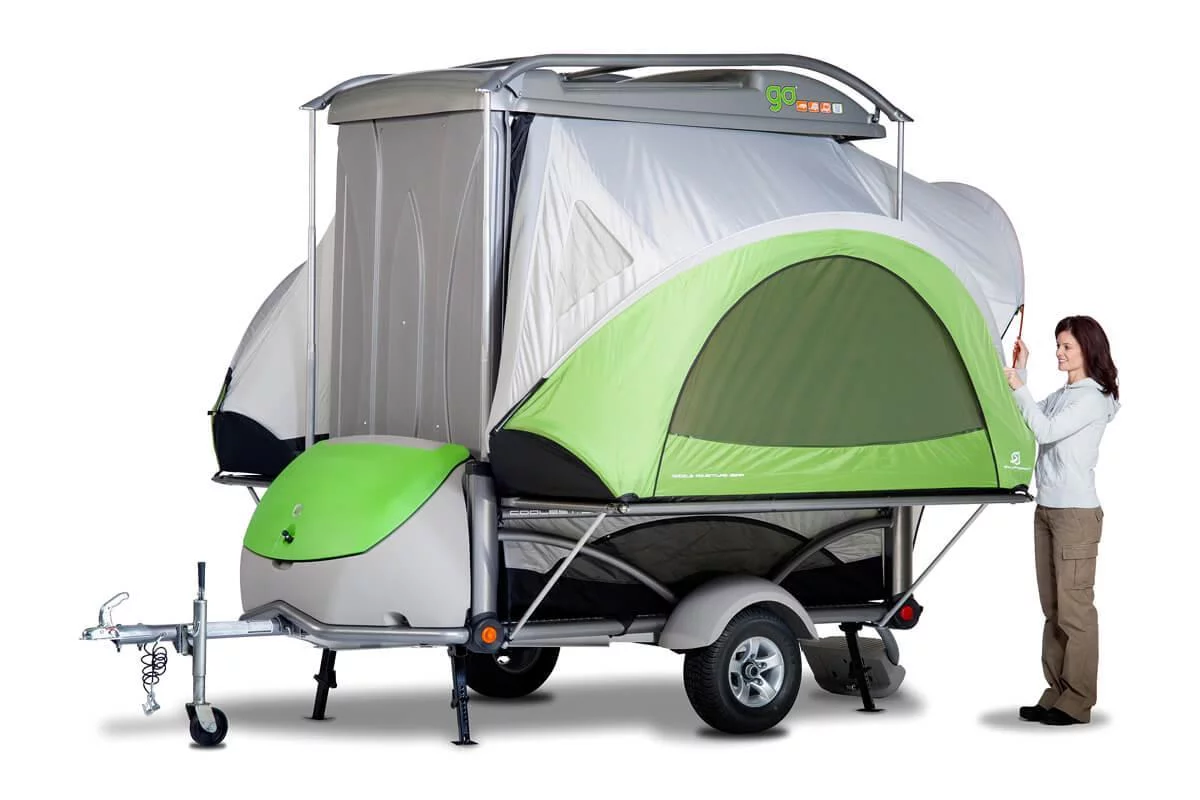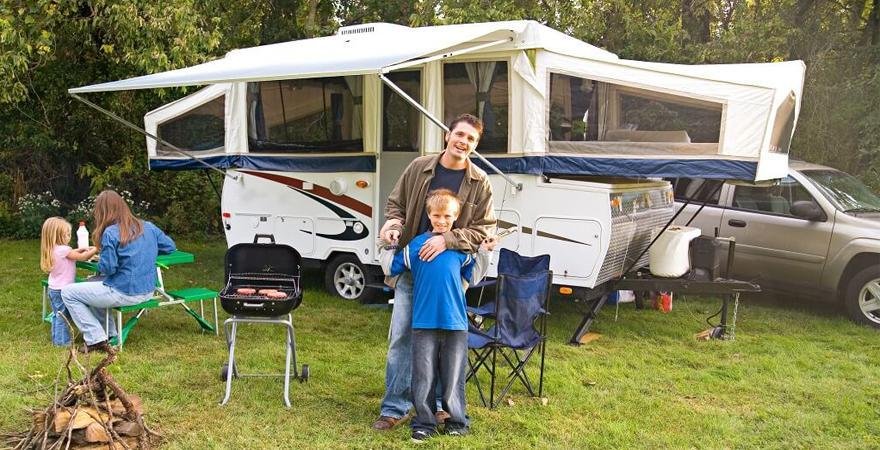Pop Up Campers are convenient and ideal for camping trips, or emergency shelter in the time of need, and are easy to tote from place to place. They are easy to store and can be towed by any size vehicle, depending on your individual needs.
If you have a large family with lots of gear and accessories, you will certainly need a big camper. Most pop up campers are affordable, but you will need to determine which size is right for your vehicle. So how much do pop up campers weigh?



Things To Consider On How Much Do Pop Up Campers Weigh
To determine the pop up campers’ weight you have to consider some certain factors. But it is not very easy to do that. So let’s examine the factors you need to consider:
1. The Size of Your Camper
The size of the camper will determine how well your vehicle can maneuver on the road. Safety is important, and your camper’s weight will impact on wear and tear of your vehicle and comfort while traveling.
a/ Small Pop Up Campers
If you have a small van or car; unless you plan to up-size your vehicle, a smaller camper may be ideal. Small pop up campers can weigh between 500 to 650 pounds. They are adequate for the needs of at least two persons traveling with basic camping gear.
Small pop up campers are easy to navigate around turns and are lightweight and unlikely to topple over. The size of your camper will also determine how fast you can go on the road. If your camper is too large, it will obstruct visibility for yourself and other road users.
Large campers will also impede your speed and use more gas per mile.A pop-up camper weighing around 650 pounds is slightly bigger with a larger interior and additional storage space.

b/ Medium Size Campers
Medium size pop up campers can weigh between 800 to 100 pounds. You will need a slightly larger engine for towing and more gas per mile. The heavier your camper, the more strain will be placed on your vehicle. Heavier campers will move at slightly slower speeds on the road. However, medium size campers are usually easy to tow with few if any challenges.
c/ Large Campers
Large pop-up campers can weigh up to 2,000 pounds.If you drive a large SUV or truck, they will be able to handle the weight, plus your camping gear. Large campers are ideal for large families or groups and can handle extended road trips easily.
They have interior space and amenities which can include a kitchenette, living area, storage and extra sleeping spaces. You will, however, need to take it slow around turns, hills and beach terrain.

2. Space and Size
There must be a good balance between the weight of your vehicle and the camper. It is important to consider the space and size before you purchase your camper.
Too much weight on the back of your vehicle will create an imbalance between the front and rear axles. Extra weight on the rear axle will place added pressure on your tires. Too little weight on the front axles will affect how well your vehicle can maneuver on varying terrain.
3. Payload Capacity
Check your payload or cargo capacity. Payload or cargo capacity is the maximum weight your vehicle can handle. It includes all occupants, cargo, accessories and the weight placed on the trailer hitch. You will need to carefully consider how much additional weight you plan to carry in your pop up camper.
Additional weight will include water, which can weigh about 8 pounds per gallon. Generators can weigh as much as 90 pounds. Racks, spare tires, trailer hitch, pets, bags, food, coolers, and occupants all add weight to your camper. Slide outs can pack an additional 800 pounds of weight to your pop up camper.
4. Hitch Weight
The hitch weight consists of the axle and tires of the camper and the tongue of the trailer. These extra pounds are directly transferred to your vehicle via the trailer hitch. Choose the right size hitch that can adequately accommodate both the trailer weight and the tongue weight.
5. Dry Hitch Weight
The dry hitch weight is the amount of weight that can be attached to your trailer ball of the vehicle, without any water or gear. It is calculated by adding the weight of the camper, the tires, and the hitch. Ideally, your dry hitch weight should be no more than 10% of the total trailer weight. The average 25’ trailer should have a dry hitch weight of around 500 pounds.
Your best bet may be a dry weight of up to 3,500 pounds so that your gross weight can stay below 5,000 pounds. Some experts recommends a 20% allowance between the dry weight, plus occupants and cargo, and the weight capacity of your vehicle.
6. Maximum Towing Capacity
Your maximum towing capacity is the total trailer weight your vehicle can carry under normal circumstances. It is the total weight (including the driver), minus any cargo or occupants.
When buying a pop-up camper, try not to use the camper’s maximum towing capacity. It is better to allow some “wiggle room” when purchasing your camper. The actual size may vary slightly from what is originally quoted. A good gauge is to add 1,500 pounds to the actual weight of the camper.
The result should not be more than 80% of the total weight of your vehicle. Any excess weight will wreck your transmission over time and reduce the speed at which you can travel, especially uphill.
7. Gross Weight
The gross weight of your pop up camper is the total trailer weight, tanks, plus the average load of gear. The gross weight is the weight each tire can handle, plus the weight the hitch and tongue can accommodate. It is based on the trailer’s tire capacity and not the actual weight of the camper itself.
8. Unloaded Weight
The unloaded weight of your pop up camper is the weight of the trailer only; no water or gear included. It is important to know your unloaded weight so that you can plan effectively for your trip. It will determine how much you can carry that will impact on safety, comfort, and navigation.

Image source: www.sylvansport.com
Crucial Tips to Determine the Pop Up Camper’s Weight
1. Safety
Safety is another priority that will determine the weight of your camper. Traction, speed, and maneuverability are safety considerations that impact on the weight of your camper.
Any trailer over 3,000 pounds needs trailer brakes. You can easily install the Trailer brake inside the tow vehicle. If you are purchasing a new pop up camper, choose one with a tow/haul mode. The two/haul mode can help you adjust your shift cycles and transmission to navigate safely when going downhill.
2. Altitude Adjustment
Check your towing rate! If you are traveling at high altitudes, your vehicle will experience less towing capacity and engine power. The higher you climb, the thinner the air gets. Your towing rate should be at least 2% for altitudes up to 1,000 feet above sea level. You will need to reduce your speed and gears accordingly.
3. Fuel Efficiency
How much your pop up camper weighs can affect how fast or slow your travel is. The weight will affect how much fuel you will use per mile and how far you can go on any trip. It’s important to manage your fuel costs when sightseeing so that you can have a comfortable and enjoyable trip. Choose a pop-up camper that will strike a good balance between the weight of the vehicle and the camper.
4. Storage Capacity
Will it depend largely on your storage need? Choose a camper that can be easily folded into smaller sizes when you are not camping. Fold-down campers can fit in garages or other spaces close to home for safety and security.
Some pop-up campers are made from canvas that can be easily folded to maximize on limited space.
5. Customizing
There is a pop-up camper for your specific needs. If you are a “newbie” to camping or a seasoned trouper, no need to worry. You can choose a camper to fit your unique tastes and style. They can be fitted with the basics for a single traveler or small family. For larger families, they can be accessorized with beds, kitchenettes, bathrooms, air-conditioning and storage shelves.
You can also add rear and overhead racks for towing bikes, kayaks, etc. to enhance your camping experience.
6. Weight and Accessories
Pop up campers are very convenient to carry. When you consider the right weight and accessories to suit your vehicle, it’s a breeze. Campers are easy to hook up to any existing vehicle. When you arrive at your destination, unhitching is usually done easily and efficiently.
Pros and Cons of Pop up Campers
Are pop up campers beneficial for any RV camper? If so, what are some of the advantages of owning a pop-up camper? And as is always the case with any other product out there, are there some known demerits of these RV camping materials? So let us discuss the pros and cons of pop up campers in details so that we can know more about them.
Is it worth spending on a pop-up camper? These are some of the questions that could be troubling your mind at this time. However, we have keenly looked at these products and came up with the following findings. They are going to be very important as you decide on whether you really need to buy a pop-up camper.
Pros of pop up campers
Cons of Pop up Campers
Those are the pros and cons of pop campers. As you have seen above, pop up campers have numerous merits compared to the demerits. You can, therefore, go ahead and buy a pop-up camper for your next RV camping session. You will definitely enjoy most, if not all of the above advantages. Pop up campers are the cheapest alternatives to tents for any camping activity.
Final Thought

Camping is a great way to connect with nature, spend time with family and explore the great outdoors. It can be educational for growing kids and a way to escape the hustle and bustle of everyday life. A pop-up camper is available for your every need. They are affordable and can be attached to your vehicle, whether large or small. Accessories such as kitchenettes, beds, racks and other accessories can be easily added for your comfort and enjoyment.
